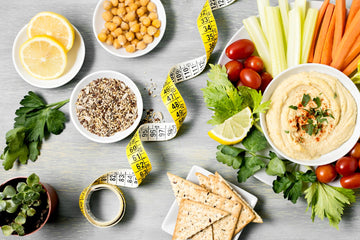Your body is like a precise clockwork mechanism that requires a specific amount of energy every day. The question "how many calories do I need?" concerns millions of people who want to achieve their health and fitness goals. The answer depends on individual factors such as age, gender, activity level, and personal goals. With the right amount of calories, you can optimally support your body in building muscle, losing weight, or maintaining it.
Key Takeaways
- Individual calorie requirement: Basal metabolic rate plus activity factor determine your personal energy requirement
- Goal-specific adaptation: calorie deficit for weight loss, surplus for muscle building, maintenance for weight stability
- Quality over quantity: Proteins, healthy fats and complex carbohydrates work differently than processed foods
- Gender differences: Men usually have higher calorie needs due to greater muscle mass
- Practical implementation: Meal prep, tracking tools and flexible control for sustainable success
- Common stumbling blocks: Avoid portion sizes, hidden calories and unrealistic expectations
What determines your individual calorie needs?

Your daily calorie requirement is made up of several components, all of which vary from person to person. Your basal metabolic rate forms the foundation—this is the amount of energy your body needs just for vital functions like breathing, heart rate, and cell renewal.
Muscle mass plays a key role in this. One kilogram of muscle tissue burns about 13 calories per day, while fat tissue burns only 4 calories. This explains why men's calorie needs are typically higher—men genetically have more muscle mass and less body fat.
Factors influencing energy consumption
Age significantly influences metabolism. Starting at age 30, the basal metabolic rate decreases by 1-2 percent annually. This decline results primarily from natural muscle loss and slowed cell renewal. Hormones such as testosterone, estrogen, and thyroid hormones also regulate metabolic rate.
Genetic factors determine about 40 percent of individual metabolic differences. Some people have naturally "thrifty" genes that were essential for survival in earlier times of food scarcity. Today, these genes can lead to weight problems when food is abundant.
Height and current weight directly influence energy requirements. Taller and heavier people require more energy for all bodily functions. Incidentally, a symptom of nutrient deficiency can be a slowed metabolism, as many vitamins and minerals serve as cofactors for metabolic processes.
How many calories do you burn per day?
The amount of calories burned daily varies considerably between different people and lifestyles. Scientists divide total energy expenditure into four main categories, which together constitute the Total Daily Energy Expenditure (TDEE).
The four pillars of energy consumption
Scientists divide total energy consumption into four distinct areas, which together determine your total calorie needs. Each component contributes differently and can be influenced to varying degrees. This breakdown helps you understand where you can start to specifically optimize your energy consumption.
- Basal Metabolic Rate (BMR): This component accounts for 60–75 percent of total energy expenditure. Women typically burn 1,200–1,400 calories, while men burn 1,600–1,800 calories for basic functions alone.
- Thermic Effect of Food (TEF): The digestion and metabolism of food consumes energy. This effect amounts to approximately 8-10 percent of the calories consumed, but varies greatly depending on the macronutrient composition.
- Exercise Activity Thermogenesis (EAT): Conscious physical activity such as strength training, running, or swimming. This component is the easiest to influence and can account for 15-30 percent of total energy expenditure in active individuals.
- Non-Exercise Activity Thermogenesis (NEAT): Unconscious movements such as gesticulation, changes in position, or involuntary muscle contractions. NEAT can vary by up to 800 calories per day between different people.
The number of calories burned daily varies considerably, even within the same person. Stress, sleep quality, hormonal fluctuations, and even the outside temperature all influence energy expenditure. On cold days, the body burns additional energy for thermoregulation.
Practical measurements show that office workers often only consume 1,800–2,200 calories per day, while people who work physically can easily burn 3,000–3,500 calories. The number of calories burned daily therefore depends heavily on work and leisure activities.
Calculate calorie needs for different goals

Calculating your optimal daily calorie requirement requires first determining your basal metabolic rate and then multiplying it by an activity factor.
Basal metabolic rate formulas for precise calculation
The Mifflin-St. Jeor equation is considered the most accurate standard formula:
- Men: (10 × weight in kg) + (6.25 × height in cm) - (5 × age) + 5
- Women: (10 × weight in kg) + (6.25 × height in cm) - (5 × age) - 161
Multiply the result by your activity factor:
- Little exercise: 1.2
- Light activity: 1,375
- Moderate activity: 1.55
- High activity: 1,725
- Very high activity: 1.9
To make these calculations more tangible, let's look at two realistic examples. The differences between activity factors can be dramatic—often several hundred calories per day.
1. Example Man: Moderately active office worker
- Profile: 30 years, 80kg, 180cm, goes to the gym 3 times a week
- Step 1: Calculate your basal metabolic rate
BMR = (10 × 80) + (6.25 × 180) - (5 × 30) + 5
BMR = 800 + 1,125 - 150 + 5 = 1,780 calories
- Step 2: Apply activity factor
TDEE = 1,780 × 1.55 (moderate activity) = 2,759 calories daily
2. Example woman: Slightly active office worker
- Profile: 28 years, 65kg, 165cm, walks twice a week + occasionally yoga
- Step 1: Calculate your basal metabolic rate
BMR = (10 × 65) + (6.25 × 165) - (5 × 28) - 161
BMR = 650 + 1,031 - 140 - 161 = 1,380 calories
- Step 2: Apply activity factor
TDEE = 1,380 × 1.375 (light activity) = 1,898 calories daily
The difference: Men need about 860 more calories per day—equivalent to an extra large meal! This difference is due to their greater muscle mass, height, and activity level.
Goal-specific calorie adjustments
Weight loss: Reduce your calculated calorie intake by 300-500 calories daily. This will result in a weekly weight loss of 0.3-0.5 kilograms. More radical deficits are counterproductive, as they promote muscle loss and a slower metabolism.
Muscle building: Increase your calorie intake by 200-400 calories above maintenance. This moderate surplus allows for muscle growth without excessive fat storage. You should consume 1.6-2.2 grams of protein per kilogram of body weight daily.
Weight maintenance: Orient yourself according to your calculated total metabolic rate. Fluctuations of ±100-200 calories are normal and will be compensated for by the body.
For optimal fat loss while maintaining muscle mass, you can find detailed strategies in our article on reducing body fat .
Why not all calories are the same

The common assumption "a calorie is a calorie" misleads many people. Different macronutrients affect the hormonal system, satiety, and metabolism in completely different ways.
The Thermic Effect of Different Macronutrients
Protein requires 20-30 percent of its calories for digestion and metabolism. Of 100 calories from chicken breast, only 70-80 calories end up in your system as usable energy. Carbohydrates use 5-10 percent, and fats only 0-5 percent for their processing.
These differences have practical implications: A high-protein diet can increase total energy expenditure by 80-100 calories per day without you consciously increasing your exercise.
Hormonal effects of different foods
Refined carbohydrates trigger sharp insulin spikes, which promote fat storage and lead to rapid return of hunger. Complex carbohydrates from whole grain products stabilize blood sugar and prolong the feeling of fullness.
Proteins stimulate the release of satiety hormones such as GLP-1 and cholecystokinin. Studies show that high-protein meals can reduce spontaneous calorie intake at subsequent meals by up to 400 calories.
Omega-3 fatty acids from fish or high-quality supplements have a positive effect on leptin sensitivity. Leptin is the "satiety hormone" that signals to the brain when there is enough energy.
Vitamins and minerals act as cofactors for hundreds of metabolic reactions. A deficiency in B vitamins, magnesium, or iron can reduce energy expenditure by 10–15 percent. You can learn which specific vitamins your body needs in our detailed article on which vitamins the body needs .
Practical strategies for sustainable success
Theoretical knowledge is only helpful if it can be applied to everyday life. Successful body composition requires practical strategies that are sustainable over the long term.
Meal prep as a foundation for success
Preparing meals for 3-4 days eliminates spontaneous, unhealthy decisions. Plan your meals so that each contains 25-30 grams of high-quality protein. This stabilizes blood sugar and maximizes the thermic effect.
Prepare a variety of protein sources: chicken breast, salmon, eggs, or plant-based alternatives. If you're vegan, high-quality protein powders can make it easier to meet your protein needs.
A structured breakfast lays the foundation for the entire day. Our breakfast guide offers over 35 protein-rich recipes and scientifically proven tips for the perfect start to the day.
Flexible control instead of rigid rules
The 80/20 rule works: 80 percent of the time with nutrient-rich, minimally processed foods, and 20 percent with room for social occasions and personal preferences. This flexibility prevents the "all-or-nothing" mentality that causes many diets to fail.
Optimize hydration and sleep
Dehydration can be misinterpreted as hunger. Drinking 2-3 liters of water daily not only optimizes metabolism but also reduces false hunger signals. Cold water also slightly increases energy expenditure.
Lack of sleep significantly disrupts hormonal balance. Less than seven hours of sleep increases ghrelin (the hunger hormone) and decreases leptin (the satiety hormone). This leads to increased appetite, especially for high-calorie foods.
Avoid the most common calorie mistakes
Even experienced athletes often make basic mistakes when it comes to calorie planning. Awareness of these pitfalls can mean the difference between success and stagnation.
Hidden calories and portion sizes
Studies document systematic underestimation of calorie intake: Normal-weight people underestimate by about 20 percent, while overweight people underestimate by as much as 40-47 percent ( Lichtman et al., 1992; Cornell University ). Especially with "healthy" foods like nuts, avocados, or olive oil, extra calories quickly add up unnoticed.
A handful of almonds (about 23 pieces) contains 160 calories. Two tablespoons of olive oil provide 240 calories. These amounts are often considered "insignificant," but can add up significantly over the course of a day.
Overestimation of training consumption
Many people dramatically overestimate their calorie expenditure during exercise. One hour of intense strength training typically burns 200-400 calories—less than the amount of energy in a large chocolate bar. Cardio training is more efficient, but even here, the values are often lower than expected.
All-or-nothing mentality
A single "bad" day often turns into a bad weekend, then a bad week. Successful people immediately return to their plan after slip-ups, without self-judgment.
Perfection isn't necessary—consistency is. One day with 500 calories over your goal makes little difference if the other six days are right.
Supplementation to achieve goals
Even with optimal calorie planning, dietary supplements can be useful for achieving goals more efficiently and closing nutrient gaps.
Protein for optimal body composition
High-quality protein powder helps meet increased protein needs without consuming additional calories from fat or carbohydrates. This is especially valuable for weight loss goals when every calorie counts.
For plant-based protein without animal products, our Vegan Protein provides all essential amino acids in an optimal composition. It also contains digestive enzymes for improved absorption and L-glutamine for accelerated recovery.
Micronutrients for optimal metabolism
Vitamins and minerals are cofactors for hundreds of metabolic processes. B vitamins support energy metabolism, magnesium is involved in over 300 enzymatic reactions, and vitamin D influences insulin sensitivity.
A lack of these influencing factors can reduce energy expenditure and make it more difficult to achieve goals.
Do you want to support your goals with scientifically sound products? Our premium supplements are developed according to the highest German quality standards and help you get the most out of your calorie planning.
Take the first step towards your goal

The right answer to "How many calories do I need?" is just the first step on the path to your health goals. True success comes from the consistent application of this knowledge, coupled with realistic expectations and the willingness to continually adapt. Your body is unique and deserves a personalized approach that is both scientifically sound and practically achievable. With patience, the right tools, and a holistic understanding of nutrition, you will not only achieve your goals but also maintain them long-term.
FAQ
How exactly can I calculate my basal metabolic rate?
The Mifflin-St. Jeor formula provides the most accurate estimates. For men: (10 × weight in kg) + (6.25 × height in cm) - (5 × age) + 5. For women, the same minus 161 instead of plus 5. Multiply the result by your activity factor, which is between 1.2 and 1.9.
Do I really have to count every calorie?
Not necessarily. For many people, controlling portion sizes and paying attention to food quality is enough. Counting calories is especially helpful for specific goals or plateaus. The 80/20 rule often works better than perfectionist approaches.
How long does it take for my metabolism to adjust?
Initial adjustments will become apparent after 1-2 weeks. Major metabolic changes take 4-8 weeks. Therefore, you should stick with a strategy for at least a month before making any major changes.
Can I increase my calorie burn by drinking more?
Yes, but minimally. Drinking cold water increases energy expenditure by about 20-30 calories per liter, as the body has to expend energy to warm the water to body temperature. The main benefit is increased satiety.
How does stress affect my daily calorie needs?
Chronic stress increases cortisol levels, leading to increased hunger, especially for sweet and fatty foods. At the same time, acute stress can slightly increase your basal metabolic rate. In the long term, the negative effects usually outweigh the positive ones.
Are there foods that boost metabolism?
Spicy spices like chili can temporarily increase metabolism by 5-10 percent. Green tea and caffeine have similar, but weaker, effects. However, the overall impact remains small compared to factors like muscle mass and activity level.
Should I eat fewer calories on rest days?
It depends on your goals. If you're trying to lose weight, a slight reduction may be beneficial. If you're trying to build muscle, you should keep your calorie intake constant, as recovery and protein synthesis require a lot of energy.
How do I know if my calorie intake is correct?
Monitor your weight gain, training performance, and overall well-being over 2-3 weeks. Healthy changes are 0.2-0.8 kilograms per week, depending on your goal. Extreme fatigue or decreased performance indicate overly aggressive deficits.





